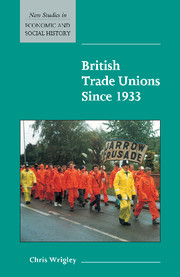Book contents
- Frontmatter
- Contents
- List of tables
- 1 Introduction
- 2 Economic recovery and war, 1933–1945
- 3 Trade union development, 1945–2000
- 4 Strikes, 1945–2000
- 5 Incomes policies, 1948–1979
- 6 Trade union legislation, 1945–2000
- 7 What have trade unions done?
- List of references
- Index
- Studies in Economic and Social History
- New Studies in Economic and Social History
1 - Introduction
Published online by Cambridge University Press: 05 June 2012
- Frontmatter
- Contents
- List of tables
- 1 Introduction
- 2 Economic recovery and war, 1933–1945
- 3 Trade union development, 1945–2000
- 4 Strikes, 1945–2000
- 5 Incomes policies, 1948–1979
- 6 Trade union legislation, 1945–2000
- 7 What have trade unions done?
- List of references
- Index
- Studies in Economic and Social History
- New Studies in Economic and Social History
Summary
In Britain both the fortunes and the public standing of the trade unions fluctuated markedly in the final two-thirds of the twentieth century. The trade unions gained much kudos in the 1940s for their role in helping to mobilise the British economy for war and for post-war economic recovery. Thereafter, as the British economy performed relatively poorly among industrialised nations, the trade unions received much blame for numerous economic ‘British diseases’, including a proneness to strike and low productivity.
Other than during the First and Second World Wars and their immediate aftermaths, British industrial relations, from at least the late nineteenth century to the 1970s, were based primarily on a willingness of employers and working people's representatives to settle differences on a voluntary basis. The two world wars boosted the spread of collective bargaining and, especially, national collective bargaining. Where major industrial confrontations occurred, or seemed likely, the government (through the Board of Trade, the Ministry of Labour and its successors) could intervene, if both parties were agreeable, and offer suggested solutions to disputes. Such action was authorised under the Conciliation Act, 1896 and the Industrial Courts Act, 1919. Compared with other countries, Britain's peacetime system of industrial relations until the 1970s was untrammelled by legal constraints, the Trade Disputes Act, 1906 having given trade unions immunity from legal actions for damages and strengthened their rights to peaceful picketing.
- Type
- Chapter
- Information
- British Trade Unions since 1933 , pp. 1 - 6Publisher: Cambridge University PressPrint publication year: 2002

